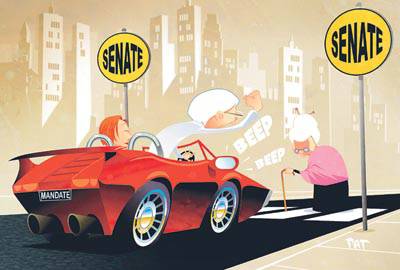|
December 14, 2007
The more things change the more they remain the same. The Senate stands in the way as a check on the executive Government. Only this time it is a Liberal Senate and a ALP Government, and the issue is industrial relations with the latter claiming a mandate to undo the Coalition's unpopular WorkChoices package.
So we have Rudd and Gillard's campaign no-negotiation rhetoric of staring down the Senate majority; the continuation of a polarizing politics based around partisan strategies:
 Pat
Pat
That was the campaign. What now? A bruised, divided Coalition is definitely on the defensive on IR, and it has few resources and has swung to the hard edge right rather than move to the centre. Are we going to have a continuation of confrontation and partisanship in which one party imposes its will over the bitter resistance of the other or the polarised parties fighting to a stalemate.
Andrew Fraser explores the issue in the Canberra Times by picking up on observations by Andrew Murray, the Democrats Senator, in post-election speech to Sixth Annual Industrial Relations Workforce Conference. Murray observed that the Whitlamesque strategy of staring down the Senate majority until it passes Labor's deal unchanged has the advantage of leaving the Coalition wedded to its unpopular package, but would mean that Gillard would be unable to implement ALP's program immediately.
Since a double dissolution on the issue is out--- it would certainly risk a reduced majority--- the next option is the minor-amendment strategy, which gets the Coalition properly into play, yielding ground, and which can be implemented either before or after July 1. Murray told the Industrial Relations Workforce Conference:
" The question is: what amendments? The Coalition would presumably want to be mollified with some backdown on individual agreements and unfair dismissals.That's not easy for Labor to stomach, given its constituency, but it won't be bad for them in the business community. And politically it would give them a three-year stick to beat the Coalition with."
Murray thinks this is the course most likely to be taken by Rudd and Gillard. If so, then the Democrats can only operate as an "honest broker" during the next six months because, they only matter up until 30 June. Come July 1, the Democrats are gone, and the Greens become pivotal along with Independent Nick Xenophon and Family First's Steve Fielding.
My guess is that the Liberals have decided on a partisan strategy that continues to divide Canberra and the country into hostile, even irreconcilable camps. They will not be satisfied with politics as the give and take of deal making.They are still caught up in their game plane of transforming the country.
|
